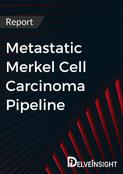metastatic merkel cell carcinoma pipeline insight
DelveInsight’s, Metastatic Merkel Cell Carcinoma - Pipeline Insight, 2026,” report provides comprehensive insights about 13+ companies and 15+ pipeline drugs in Metastatic Merkel Cell Carcinoma pipeline landscape. It covers the pipeline drug profiles, including clinical and nonclinical stage products. It also covers the therapeutics assessment by product type, stage, route of administration, and molecule type. It further highlights the inactive pipeline products in this space.
Geography Covered
- Global coverage
Metastatic Merkel Cell Carcinoma Understanding
Merkel cell carcinoma (MCC) is a rare, aggressive neuroendocrine tumor of the skin with increasing incidence. It most frequently presents on the head and neck region of elderly, white males. Specific risk factors include ultraviolet (UV) exposure, advancing age, and immunosuppression, and its development is associated with Merkel cell polyomavirus (MCPyV) infection. Skin biopsy is diagnostic, and sentinel lymph node evaluation should be performed in all patients who are diagnosed with MCC, as the disease typically has a rapidly progressive course. Treatment consists of wide local excision with or without adjuvant radiotherapy for the local disease. New therapies for metastatic MCC have shown promise and include immune-based therapies.
"Metastatic Merkel Cell Carcinoma - Pipeline Insight, 2026" report by DelveInsight outlays comprehensive insights of present scenario and growth prospects across the indication. A detailed picture of the Metastatic Merkel Cell Carcinoma pipeline landscape is provided which includes the disease overview and Metastatic Merkel Cell Carcinoma treatment guidelines. The assessment part of the report embraces, in depth Metastatic Merkel Cell Carcinoma commercial assessment and clinical assessment of the pipeline products under development. In the report, detailed description of the drug is given which includes mechanism of action of the drug, clinical studies, NDA approvals (if any), and product development activities comprising the technology, Metastatic Merkel Cell Carcinoma collaborations, licensing, mergers and acquisition, funding, designations and other product related details.
Report Highlights
The companies and academics are working to assess challenges and seek opportunities that could influence R&D Metastatic Merkel Cell Carcinoma. The therapies under development are focused on novel approaches to treat/improve Metastatic Merkel Cell Carcinoma.
Metastatic Merkel Cell Carcinoma Emerging Drugs
Retifanlimab: Incyte
Retifanlimab (formerly INCMGA0012), an investigational intravenous PD-1 inhibitor, is currently under evaluation in registration-directed trials as a monotherapy for patients with microsatellite instability-high endometrial cancer, Merkel cell carcinoma and squamous cell carcinoma of the anal canal (SCAC); and in combination with platinum-based chemotherapy for patients with non-small cell lung cancer and SCAC.
Further product details are provided in the report……..
Metastatic Merkel Cell Carcinoma: Therapeutic Assessment
This segment of the report provides insights about the Metastatic Merkel Cell Carcinoma drugs segregated based on following parameters that define the scope of the report, such as:
Major Players in Metastatic Merkel Cell Carcinoma
There are approx. 13+ key companies which are developing the therapies Metastatic Merkel Cell Carcinoma. The companies which have their Metastatic Merkel Cell Carcinoma drug candidates in the most advanced stage, i.e Phase II include Incyte
Phases
DelveInsight’s report covers around 15+ products under different phases of clinical development like
- Late stage products (Phase III)
- Mid-stage products (Phase II)
- Early-stage product (Phase I) along with the details of
- Pre-clinical and Discovery stage candidates
- Discontinued & Inactive candidates
Route of Administration
Metastatic Merkel Cell Carcinoma pipeline report provides the therapeutic assessment of the pipeline drugs by the Route of Administration. Products have been categorized under various ROAs such as
- Oral
- Intravenous
- Subcutaneous
Molecule Type
Products have been categorized under various Molecule types such as
- Small molecule
- Cell Therapy
- Peptides
- Polymer
- Small molecule
- Gene therapy
Product Type
Drugs have been categorized under various product types like Mono, Combination and Mono/Combination.
Metastatic Merkel Cell Carcinoma: Pipeline Development Activities
The report provides insights into different therapeutic candidates in phase II, I, preclinical and discovery stage. It also analyses Metastatic Merkel Cell Carcinoma therapeutic drugs key players involved in developing key drugs.
Pipeline Development Activities
The report covers the detailed information of collaborations, acquisition and merger, licensing along with a thorough therapeutic assessment of emerging Metastatic Merkel Cell Carcinoma drugs.
Metastatic Merkel Cell Carcinoma Report Insights
- Metastatic Merkel Cell Carcinoma Analysis
- Therapeutic Assessment
- Unmet Needs
- Impact of Drugs
Metastatic Merkel Cell Carcinoma Report Assessment
- Pipeline Product Profiles
- Therapeutic Assessment
- Pipeline Assessment
- Inactive drugs assessment
- Unmet Needs
Key Questions
Current Treatment Scenario and Emerging Therapies:
- How many companies are developing Metastatic Merkel Cell Carcinoma drugs?
- How many Metastatic Merkel Cell Carcinoma drugs are developed by each company?
- How many emerging drugs are in mid-stage, and late-stage of development for the treatment of Metastatic Merkel Cell Carcinoma?
- What are the key collaborations (Industry–Industry, Industry–Academia), Mergers and acquisitions, licensing activities related to the Metastatic Merkel Cell Carcinoma therapeutics?
- What are the recent trends, drug types and novel technologies developed to overcome the limitation of existing therapies?
- What are the clinical studies going on for Metastatic Merkel Cell Carcinoma and their status?
- What are the key designations that have been granted to the emerging drugs?



